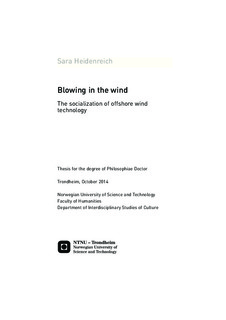| dc.contributor.advisor | Sørensen, Knut Holtan | nb_NO |
| dc.contributor.advisor | Lagesen, Vivian A. | nb_NO |
| dc.contributor.author | Heidenreich, Sara | nb_NO |
| dc.date.accessioned | 2014-12-19T13:09:32Z | |
| dc.date.available | 2014-12-19T13:09:32Z | |
| dc.date.created | 2014-10-22 | nb_NO |
| dc.date.issued | 2014 | nb_NO |
| dc.identifier | 757538 | nb_NO |
| dc.identifier.isbn | 978-82-326-0484-5 (printed ver.) | nb_NO |
| dc.identifier.isbn | 978-82-326-0485-2 (electronic ver.) | nb_NO |
| dc.identifier.uri | http://hdl.handle.net/11250/244230 | |
| dc.description.abstract | The development of renewable energy technologies is a widely acknowledged strategy to address climate change. However, for a successful implementation of technology, socialization, i.e. embedding the technology into society, is crucial. This thesis deals with the socialization of the emerging offshore wind technology in Norway. In particular, it focuses on two potential agents of socialization, news media and scientists.
The first paper, Dingpolitik at Sea: Offshore wind energy in the news media discourse, focuses on news media as socialization agents. Siting renewable energy offshore is often considered a solution to implementation problems onshore, as it is “out of sight, out of mind”. By analyzing the Norwegian news media discourse on offshore wind energy, this paper investigates whether moving wind turbines at sea really prevents controversy. It finds that although media coverage is largely positive, still, offshore wind energy is contested mainly within economic, environmental and moral frameworks. Further, values and concerns rather than facts are contested in the media debate, while the technology, in its physical form, is blackboxed.
The second paper, Sublime technology and object of fear: Offshore wind scientists assessing publics, and the third paper, Outreaching, outsourcing, and disembedding: How offshore wind scientists consider their engagement with the public, address offshore wind scientists as socialization agents. They study the scientists’ imaginings of the public(s) and their socialization strategies. The findings indicate that the scientists construct ambivalent narratives about the public(s). The continued presence of narratives of a negative public in the context of a technology that is supposed to be “out of sight, out of mind,” could be understood as an act of othering the public. Moreover, most scientists did not embrace their role as agents of socialization. Rather, the strategies of outsourcing the socialization to other actors and of disembedded technology development, i.e. declaring socialization unnecessary, are common.
The thesis highlights the important role of the media both as agent of and arena for socialization. Furthermore, considering the hesitance among scientists to act as agents of socialization, it suggests that other actors may be more suitable agents of socialization. It also points to the significance of the “out of sight, out of mind” motive which is used to construct socialization as irrelevant and disembed technology development. Hence, the new trend to produce renewable energy at sea may present new challenges for its socialization. | nb_NO |
| dc.description.abstract | Utvikling og utbygging av ny fornybar energiteknologi er allmenn anerkjente strategier for å bekjempe klimaendringene. Men for å få til en vellykket implementering, er sosialisering, dvs. forankring av teknologien i samfunnet, avgjørende. Denne avhandlingen tar for seg sosialiseringen av ny offshore vindteknologi i Norge, og fokuserer på to potensielle sosialiseringsagenter, nyhetsmedier og forskere.
Den første artikkelen, Dingpolitik at Sea: Offshore wind energy in the news media discourse, fokuserer på nyhetsmedier som sosialiseringsagenter. Plassering av fornybar energi til havs betraktes ofte som en løsning på implementeringsproblemer på land, siden teknologien da er "ute av syne, ute av sinn". Ved å analysere den norske mediediskursen rundt offshore vindkraft, undersøker artikkelen om det virkelig er ukontroversielt å flytte vindturbinene til havs. Den viser at selv om mediedekningen av temaet i stor grad er positivt vinklet, er offshore vindkraft likevel omstridt, særlig innenfor økonomiske, miljømessige og moralske rammer. Videre er det gjerne verdier og bekymringer snarere enn fakta som diskuteres i mediedebatten, mens teknologien, i sin fysiske form, forblir skjult i en «svart boks».
Den andre artikkelen, Sublime technology and object of fear: Offshore wind scientists assessing publics, og den tredje artikkelen, Outreaching, outsourcing, and disembedding: How offshore wind scientists consider their engagement with the public, fokuserer på offshore-vind-forskere som sosialiseringsagenter. Artiklene analyserer forskernes sosialiseringsstrategier og deres forestillinger av allmennheten. Funnene tyder på at forskerne konstruerer ambivalente fortellinger om allmennheten. At det stadig knyttes historier om en negativ allmennhet til en teknologi som er ment å være "ute av syne, ute av sinn", kan ses på som en fremmedgjøring av allmennheten. Svært få forskere påtok seg rollen som sosialiseringsagenter, snarere var det vanlig å overlate sosialiseringen til andre aktører, eventuelt å forstå teknologiutvikling som uavhengig av samfunnet og allmennheten.
Avhandlingen belyser den viktige rollen mediene har både som arena for sosialisering og som sosialiseringsagenter. Med bakgrunn i at forskerne nøler med å ta på seg oppgaven som sosialiseringsagenter, foreslår avhandlingen at andre aktører kan være bedre egnete til å sosialisere teknologien. Den peker også på viktigheten av "ute av syne, ute av sinn"-motivet, som brukes til å konstruere sosialisering som irrelevant, og til å løsrive teknologiutviklingen fra samfunnet. På den måten kan den nye trenden å produsere fornybar energi til havs skape nye utfordringer for sosialiseringen av teknologiene. | nb_NO |
| dc.language | eng | nb_NO |
| dc.publisher | Norges teknisk-naturvitenskapelige universitet | nb_NO |
| dc.relation.ispartofseries | Doktoravhandlinger ved NTNU, 1503-8181; 2014:286 | nb_NO |
| dc.title | Blowing in the wind: The socialization of offshore wind technology | nb_NO |
| dc.type | Doctoral thesis | nb_NO |
| dc.contributor.department | Norges teknisk-naturvitenskapelige universitet, Det humanistiske fakultet, Institutt for tverrfaglige kulturstudier | nb_NO |
| dc.description.degree | PhD i estetiske fag | nb_NO |
| dc.description.degree | PhD in Humanities and the Arts | en_GB |
